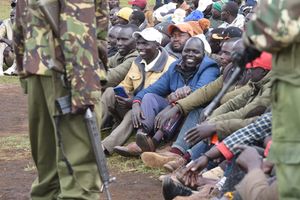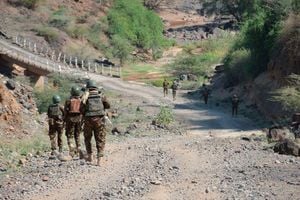
Police officers at the Ltungai Valley in Samburu West. Armed bandits have built an impregnable territory inside the valley where they keep stolen livestock.
A comprehensive MPs’ investigation has laid bare how steep bride price and politicians arming criminals are the main causes of banditry and insecurity in six North Rift counties, Kenya’s pressing concern for many years.
The details of the security situation in the north rift counties of Baringo, Elgeyo Marakwet, Turkana, West Pokot, Samburu and Laikipia, are characterized by criminal activities in the form of banditry, cattle rustling and inter-communal conflicts.
With the vulnerable populations- women, children and the elderly, the most affected, insecurity in the region has resulted into loss of lives, displacement of innocent populations and economic instability.
There is also destruction of property including homes, schools and other social amenities as bandits escalate attacks on residents, security personnel, government facilities and motorists.
The security situation, the report says, is fueled by among others, low prioritization of education and high poverty rates have been highlighted in the Administration and Internal Security Committee of the National Assembly laid in the House last month.
The inquiry into the state of security in the six North Rift counties, lays bare the situation on the ground with lives lost, displacement of human population with property including homes, schools and other social amenities destroyed.
The MPs’ inquiry, conducted over a period of nine months- from August 2023 to April 2024, shows that banditry and cattle rustling arise from multiple factors.
They include commercialization of stock theft, the sentimental value attached to livestock, entrenched traditional practices, the use of high bride price in the form of livestock paid in the region and the need for restocking after prolonged drought seasons among others.
Also blamed for insecurity in the six counties is the scarcity and shrinking resources such as water and pastureland, the expansion of grazing lands, shift towards commercializing pastoralism and political interests have resulted in aggressive territorial expansion.
The continued insecurity situation in the region has had devastating effects- loss of lives, destruction to property including homes and schools among others, displacement of communities, closure of schools disrupting learning and widespread disruption of livelihoods.
There is also a high rate of orphans, widows and widowers, poverty, high student dropout rates at all educational levels and low development rates.
“Insecurity in the region primarily stems from outdated cultural practices such as livestock raids driven by commercial motives, high bride prices, restocking after prolonged droughts and the glorification of warriors,” the report of the committee chaired by Narok West MP Gabriel Tongoyo shows.
While preparing the report, the committee received technical support from Parliament staff- Principal Clerk Assistant 1 Mr George Gazemba, Clerk Assistant 1 Mr Phillip Lekarkar and Mr Daniel Ominde, Research Officer III.
The report further illustrates the challenges men intending to marry go through to raise the required dowry usually paid in the form of livestock before they are given wives.
“Young men ready to marry are overstretched and have to use all means available to obtain cattle to fulfil the social obligation. This exacerbates the security situation in the region,” notes the report.
The report indicates that the six counties are predominantly inhabited by pastoralist communities and are among the least developed in the country, having faced marginalization during both the colonial and independent period.
The landscape is characterized by harsh terrain and a variable climate, presenting unique challenges that largely dictate the region’s economic activities.
Pastoralism remains the primary livelihood due to the difficulty of cultivating the arid and semi-arid lands that comprise much of the area.
Although the government has deployed measures to end the insecurity, the report shows that resolving tribal clashes in the region was unending due to agitations by some elected local leaders “who contribute to disharmony for political advantage.”
The report, while singling out Baringo and Turkana as the main counties where politicians are accused of incitement, reveals that lack of motivation for security officers, coordination issues among security teams and instances of community incitement are challenges to restoration of security in the region.
Lack of morale is attributed to insufficient security personnel, lack of essential equipment such as Mine-Resistant Ambush Protected (MRAP) vehicles, Armoured Personnel Carriers (APCs), helicopters and the proliferation of illegal firearms among communities.
The report further discloses that boundary and territorial disputes, “particularly” where a community has encroached upon parts of other communities exacerbate the insecurity situation.
This even as it divulged that political incitement and support for banditry by leaders seeking office, alongside the commercialization of banditry through unregulated markets and livestock trade have worsened security challenges.
“An instance was highlighted in Tiati Constituency in Baringo that had six MPs since independence and political incitement and intensity of violence is tied to the election of some MPs.”
The inquiry reveals that communities often cite the need for firearms to protect their livestock, yet misuse of these weapons has led to significant loss of life and property.
“Some witnesses submitted that the voters were promised pastures for grazing which essentially means avenues for cattle rustling,” the report says.
In February 2023, the Interior Cabinet Secretary declared the prevailing security situation in parts of the six counties in the North Rift as a national emergency.
Accordingly, the CS through a gazette notice of February 23, 2023, declared certain specified areas in the six counties as “disturbed” and “dangerous”.
To further enhance the security situation, the government launched Operation Maliza Uhalifi in the North Rift designed to restore law and order, safeguard communities from organized banditry and deter territorial expansion in the six counties.
The report shows that despite a generally peaceful situation in Laikipia, its North sub-county faces challenges due to its porous border with Samburu and Isiolo counties.
“Armed pastoralists from these areas migrate with their livestock to Mukogodo forest without local consent, leading to increased insecurity, livestock theft and human wildlife conflicts,” the report shows.
It goes on to state that the bandits have targeted private ranches, police and national government officers resulting in fatalities, community displacement and livestock theft with some of the stolen livestock traced and recovered in Isiolo and Samburu counties.
Notable stock theft, attempted thefts and banditry have been reported in Baringo North, Baringo South, Tiaty East and Tiaty West sub counties.
Baringo South has experienced attacks that have forced students to use classes as dormitories due to inadequate facilities.
“Kagir primary school has faced hostility from Tiaty herders driving livestock into Tugen territory while Chemorongion primary school has had intermittent operations due to security concerns.”
According to the report, the Ilchamus community in Mukutani Ward has suffered attacks from Tiaty bandits for 17 years, resulting in displacement and significant losses.
In Samburu County, persistent cross-border raids and attacks by Pokot bandits from Tiaty and Laikipia have caused “significant” displacement, loss of life and livestock theft severely affecting the pastoral Samburu community.
The inquiry identifies Amaiya-Malasso-Suguta valley as a “major conflict hotspot.”
“Armed Pokot bandits exploit the rugged terrain and harsh weather to conduct raids, evade law enforcement and hide stolen livestock.”
The border zone from Longewan to Morijo also experiences intense conflict leading to substantial livestock losses, community displacement and disruption of livelihoods.
“The conflicts have evolved from traditional rustling to more violent acts, including killings and widespread displacement, driven by a perceived agenda of territorial expansion by the Pokot,” the report says.
This is after revelation that residents of Lolmolog, Longewan, Losuk and Lesidai areas of Samburu Central suffer from severe consequences including loss of life, property damage and vandalism of social utilities.
Many businesses and agricultural activities have been abandoned and schools closed disrupting education with residents “accusing the Pokot community of exploiting the conflict to unlawfully reclaim territories like Losuk.”
Although the report notes that Turkana County has reported a decrease in cattle theft and highway banditry, incursions by Toposa from South Sudan and Dasanach from Ethiopia continue in Lokichoggio and Kibish sub-counties.
These incursions are driven by the search for pasture and water.
In Turkana East, high security persists, marked by livestock raids and road banditry along the Chemolingot-Kapedo-Lokori road.
Conflicts over pasture and water between Turkana and Pokot pastoralists, particularly in Nadome, Lomelo, Kapedo, Napeitom and Lochakula are frequent.
The disputed ownership of Kapedo trading centre has further intensified tensions, leading to “significant” displacement, loss of livestock, destruction of public amenities and disruption of NGOs operations.
“Poor road networks and lack of power exacerbate poverty levels while school and dispensary closures have disrupted education and health services.”
In West Pokot County despite general peace, there have been sporadic incidents of livestock theft and banditry leading to fatalities and injuries.
Two sub-locations bordering Elgeyo Marakwet have been abandoned due to Marakwet bandit aggression.
In Elgeyo Marakwet, the initial conflicts were primarily between the Marakwet and Pokot communities along the Kerio River border.
The river, which marks the boundaries between Elgeyo Marakwet, Baringo and West Pokot counties ensures clear territorial delineation.
In 2023, increased security measures led Marakwet bandits to shift their activities within their own community. Despite efforts to recover stolen livestock and apprehend bandits, significant violence and theft have persisted.
In Marakwet East sub-county, while incidents of cattle rustling and banditry have decreased, severe attacks such as the Murkutwo massacre and the killing of school children by Pokot bandits have been reported.
“Frustration with government protection efforts has prompted some Marakwet community members to acquire weapons of self-defense,” the report says.
The conflicts in the six counties, the report says, are exacerbated by the proliferation of arms- automatic weapons.
The cycle of attacks and counter attacks intensifies heightening the demand for firearms and further escalating the situation.
Small arms have empowered bandits transforming traditional raids into organized and deadly operations.
Porous borders and ungoverned spaces provide safe havens for criminals, hindering the efforts of security forces.
Political actors are alleged to provide support, including weapons and resources to groups involved in cattle rustling and banditry to gain influence or control over certain regions.
“This weaponization of violence has escalated conflicts, making them more lethal.”
Culturally, the possession of firearms among the youth incentivizes participation in cattle raids, driven by the desire to reclaim cattle exchanged for weapons.
This cycle perpetuates further attacks and glorifies the raiders, who receive cultural recognition for their violent actions.
Such a system of praise fosters a perilous environment wherein young individuals are motivated to engage in conflicts to gain social status.
Additionally, there is a “troubling trend” where cattle raids have increasingly become commercialized.
Stolen cattle are now being sold for monetary gain rather than for traditional restocking purposes.
This shift from cultural replenishment to financial profit has exacerbated the negative consequences of these raids, amplifying their adverse impact on the community.
The committee noted that despite the efforts, the government has not achieved significant success as certain areas within these counties have continued to experience recurrent and sporadic attacks leading to loss of lives and destruction to property.
The committee further noted that the government’s success faces multiple obstacles including limited resources, proliferation of arms, vast and rugged terrain and commercialization of banditry.
The underlying socio-economic factors including poverty, unemployment and limited access to essential services further contribute to the rate of lawlessness in the region.
In addressing the security issues affecting the six counties, the committee recommended the strengthening of the capacity of the security forces, enhancing community-level interventions and fostering sustainable peace initiatives and development.
Deployment of specialized units to the volatile areas, recruiting and deploying NPRs, convening meetings with various stakeholders including the local community and conducting security operations may have slowed down the bandits but not to levels expected.









